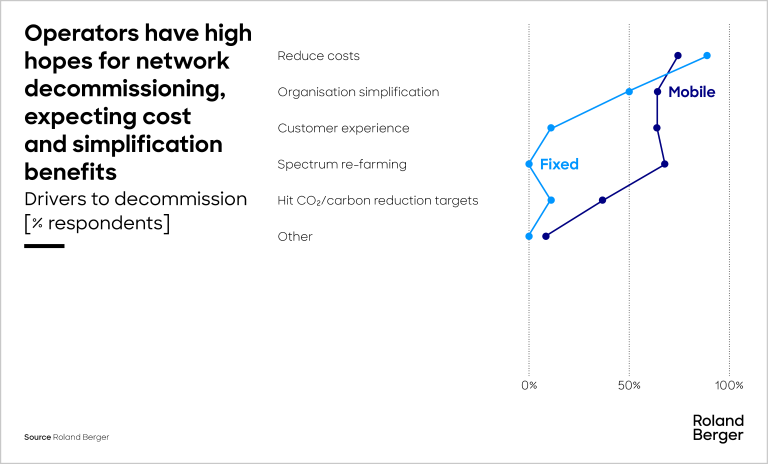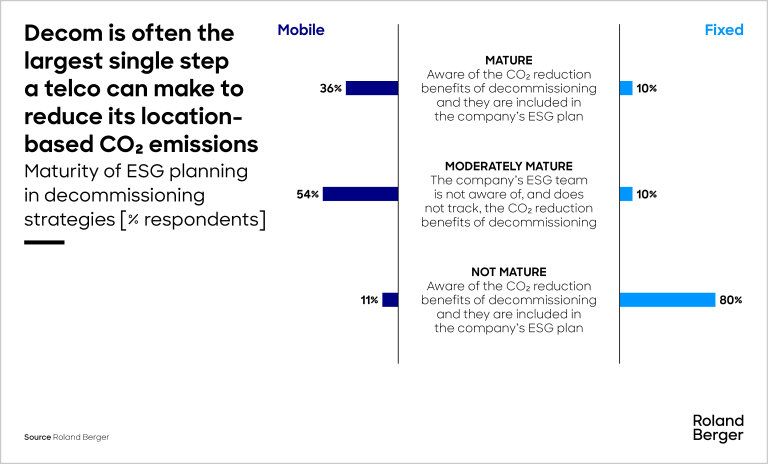How changes in macroeconomics are affecting deal flow and investment
The Decom and Decarb Double
![{[downloads[language].preview]}](https://www.rolandberger.com/publications/publication_image/Roland_Berger-INS_1049-Telco_Decom_Decarb_Survey-DT_download_preview.jpg)
Insights on network decommissioning


The age of accumulating telecom networks is coming to a close. The financial and environmental case for decommissioning (‘Decom’) legacy networks—when fully understood—is just too compelling. But whilst some operators are making progress, in our view, most are not positioned to take full advantage and reap all of the benefits. To an extent this is understandable, since there are so few recent precedents for large scale decommissioning. Without a clear-eyed view of the full case, operators are missing a trick and risk needless delays on one of the most financially and environmentally attractive decarbonisation (‘Decarb’) programmes available today. In this research, Roland Berger outlines which levers are most often overlooked by operators and use a case study to show the full value of pulling all levers in the business case from both an economic and emissions perspective. We identify the key benefits and concerns pinpointed by industry participants, and summarise the three types of operators who stand to benefit most from rethinking their decommissioning plans.
For many, the answer has been to prepare for PSTN/copper switch off in fixed line and 2G/3G shutdowns in mobile. In our study, both fixed and mobile operators anticipate reduced costs (power savings, less maintenance, etc.) and simplification (for example, network planning). Mobile network operators also expect benefits from spectrum farming (i.e., redeploying 3G spectrum towards 5G usage) which should improve customer experience.

Decom is often the largest single step a telco can make to reduce its location-based CO2 emissions but this is not widely shared with the ESG community. In our experience, Network Architects understand the emissions benefits, but it is not often the key driver, so ESG teams are involved late or not at all. This limits opportunities to define the programme to take maximum advantage of the emissions benefits, particularly from a reporting perspective. End consumers are clear that they want to see emissions reductions and operators must take every opportunity to demonstrate progress.

"In a world of EBITDA pressures and an impending climate crisis, operators have a rare window of opportunity to deliver on both objectives with one initiative. We see fixed line incumbents, more established alt-nets and network modernisers as particularly well placed to take advantage."
Taking full advantage of the network decommissioning opportunity is a significant undertaking, which fuels respondents’ number one concern –that it will distract from business as usual. Operators are often running at pace to deliver 5G, Fibre to the Premise, virtualisation, IT simplification and a host of other initiatives. Many operators will feel they just don’thave the capacity for more, and the fragmented nature of the supply base only adds to the challenge (3rd most commonly cited concern). Beyond questions of distraction and staff capacity, respondents also point to concerns around cost constraints (2nd most common response) and the financial case (5th most common response). “There is probably a business case but we can’t afford more pressure on EBITDA” said one respondent. Roland Berger’s work with telecom clients suggest these concerns are often misplaced or overstated. Given how few operators are taking full advantage of all the decommissioning value levers, we see many examples where operators do not have visibility of the full financial case and subsequently struggle to prioritise appropriate funding.
![{[downloads[language].preview]}](https://www.rolandberger.com/publications/publication_image/Roland_Berger-INS_1049-Telco_Decom_Decarb_Survey-DT_download_preview.jpg)
Insights on network decommissioning

